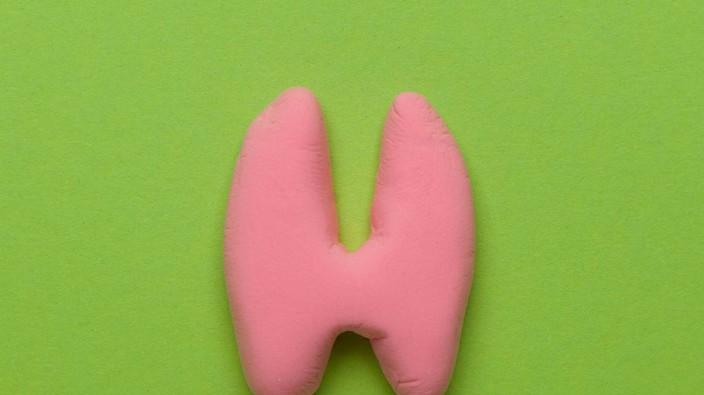as far as underappreciated organs go, the thyroid might top the list. the small, butterfly shaped gland performs a vital service synthesizing hormones and releasing them throughout the body to control important functions in the heart, muscles, digestive system and brain, among others. it sits just above the voice box at the front of the neck, wraps around the windpipe and extends around the side of the throat.
what does the thyroid do? the thyroid regulates the body’s metabolic rate, controlling everything from your heart rate to how quickly you burn calories. essentially, the food you eat is converted into energy that is used to keep your body’s systems working correctly. the thyroid controls that process, and if it is working as it should, it sends out the exact number of hormones needed to make sure the body grows, develops and runs properly.the thyroid gets its instructions from the pituitary gland, a small gland located at the bottom of the brain. the pituitary gland sends out a hormone called the thyroid-stimulating hormone that makes sure the thyroid stays on schedule.a functioning thyroid depends on a proper supply of iodine. we don’t need very much of it, but iodine is essential in making sure the thyroid works properly. iodine is found in many common foods such as dairy and seafood, but it can be taken as a supplement as well if needed.
can you live without a thyroid? yes. if you do not have a thyroid, your body will not produce the hormones and energy necessary to function properly, but those hormones can be replaced with medication. the thyroid is removed through a procedure called a thyroidectomy, but in some cases only a portion of the thyroid may need to be removed and it can function properly without that portion. cancer is the most common reason for a thyroidectomy.
what diseases are associated with the thyroid? the most common problems with the thyroid occur when the gland is either overactive or underactive. both conditions are serious and require medical attention.an overactive thyroid, known as
hyperthyroidism, occurs when it produces too much of its hormone. this condition affects about one per cent of women, is less common in men and is often treated with beta blockers or other medication to stop the thyroid from producing so much hormone. some of the symptoms of an overactive thyroid include; restlessness, nervousness, a racing heart, irritability, increased sweating, and anxiety.the most common cause of hyperthyroidism is a condition called graves’ disease, an auto-immune disorder that occurs when the body mistakenly attacks the thyroid. bulging of the eyes is another symptom of hyperthyroidism that happens when someone has graves’ disease.
hypothyroidism, also known as an underactive thyroid, can occur after a removal or partial removal of the thyroid, from damage done during radiation therapy or in the presence of hashimoto’s thyroiditis. hashimoto’s thyroiditis, also known as chronic lymphocytic thyroiditis, is the most common cause of an underactive thyroid and can occur at any age, but it most common in middle-aged women. it causes inflammation of the thyroid and destroys the gland’s ability to produce hormones. some of the most common symptoms of hypothyroidism include; fatigue, depression, constipation, heavy and irregular menstruation and an enlarged thyroid gland (goiter). hypothyroidism is often treated with thyroid hormone pills.
other problems with the thyroid goiter, a noncancerous enlargement of the thyroid, is another common problem with the gland. goiter is the result of an iodine deficient diet and can result in difficulty breathing, tightness in the neck and hoarseness of the voice. goiters are not usually severe enough for cause much of a problem, but they can result in the removal of the thyroid if left untreated and causing complications.thyroid nodules are another type of growth that can affect the gland. they grow on or in the thyroid and are also associated with a lack of iodine in the diet. the nodules are often benign and too small to detect, but can also be cancerous and grow large enough to result in swelling inside the neck.
who is most affected by thyroid diseases? anyone at any age can be affected by problems with the thyroid but many of the thyroid problems are more common in middle-aged women. according to the
thyroid foundation of canada, about 200 million people in the world have some form of thyroid disease. in canada, one in 10 canadians suffer from a thyroid condition — of those, as many as 50 per cent are undiagnosed.
nick beare is a writer with healthing.ca
